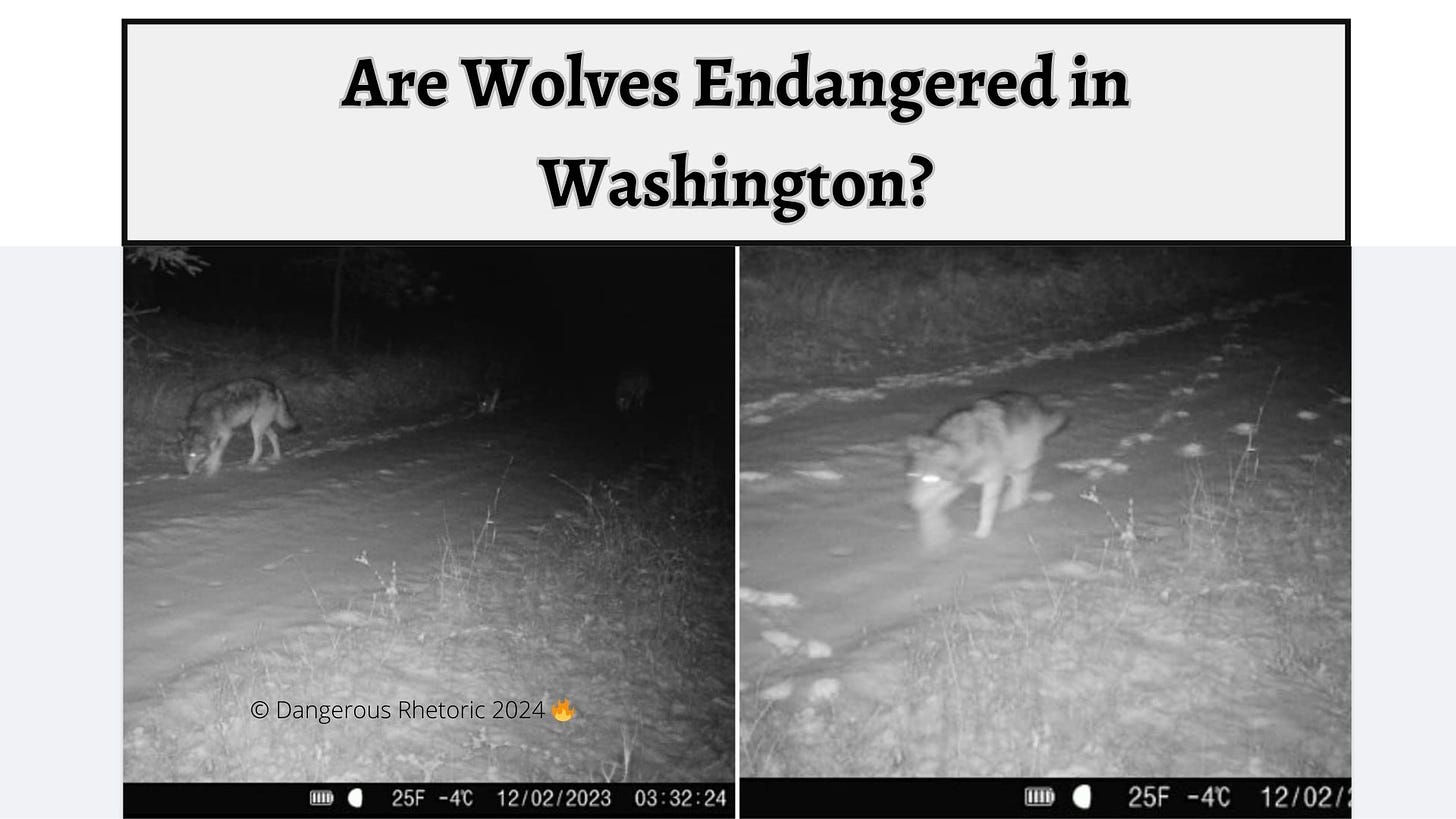The Washington Department of Fish and Wildlife is proposing to reclassify the gray wolf from “endangered” to “sensitive.” The department is soliciting comments from the public for this proposal.
What do you think?
Lets consider the definitions of endangered and sensitive. According an article by Randy Bracht in The Center Square on Feb. 9, the Washington Administrative Code defines endangered as “seriously threatened with extinction throughout all or a significant range within the state.” Sensitive is defined in the WAC as “vulnerable or declining and likely to become endangered or threatened…”
The WDFW explains on the public comment page that “This proposed reclassification reflects the significant progress toward recovery that Washington’s wolf population has made since the original state listing in 1980 but recognizes that wolves remain vulnerable in western Washington and should continue to be managed for recovery within the state as a protected species.”
In his article, Bract explains, “According to the department, the state’s wolf population has grown by an average of 23% annually since the agency conducted an initial survey in 2008. In 2022, WDFW and tribes counted 216 wolves in 37 packs, including 26 successful breeding pairs. Many of the animals are found in the timbered, mountainous northeast corner of the state.”
Running out of food?
The area with most of the wolves includes Okanogan, Ferry, Stevens and Pend Orielle counties. With so many wolves in such a small area, there’s bound to be an imbalance in the ecosystem. The citizens of these counties point out the once-abundant herds of deer and elk are shrinking rapidly, and livestock, especially young stock, is now a favorite item for hungry wolves.
The problem of losing young stock is a big one. Young animals are easy prey for the wolves, which can easily carry a baby animal back to their dens. Without a carcass, the livestock owners cannot prove the predation. Often, all the stock owner has to “prove” the loss is a mama calling for her lost baby.
Since many local residents have very small groups of animals, often fewer than 20, they can’t afford to lose even one baby. In the winter, these losses aren’t up in the mountains, as the stock are in the lowlands. Even bigger livestock operators are losing stock within yards of their homes, even after deploying all of the recommended deterrents. Wolves are smart, and the young sheep, goats, calves, and even donkeys and llamas are “fast food” for them.
What would happen if wolves are reclassified?
First off, the state classification does not impact the federal classification, which is still “endangered” in western Washington. The federal classification for wolves in Eastern Washington has already been downgraded to “threatened.”
In addition, the WDFD notes in their proposal that “The anticipated effects of the proposed rule amendments would be minimal. Protective measures will remain in effect for wolves in Washington if the proposed rule amendments are approved.”
“Changing the classification of wolves to state Sensitive status would continue to protect them from unlawful take under Chapter 77.15 RCW. The species would continue to be protected from malicious and intentional harassment. RCW 77.15.130 outlines that Sensitive wildlife shall not be hunted, taken, or harassed. In addition, the proposed Sensitive status is a sub-category of protected wildlife, which ‘shall not be hunted or fished.’ Wolves would also remain on the list of Priority Habitats and Species (PHS).”
Follow the science!
In its proposal, the WDFW relies on scientific information contained in the Periodic Status Review for the Gray Wolf. This report provides evidence that the wolf population no longer meets the definition of endangered. There have been 14 consecutive years of population growth, and population models predict the wolf population is robust and will continue to grow and expand its range into other regions.
Based on the available science, I agree with the proposal of the WDFW to reclassify the gray wolf. If you also agree, you should be sure to comment in support of the proposal at the CR 102 Rule Public Input page.
Please also comment on the SEPA comment page. All comments will be part of the public record.
Nancy Churchill is a writer and activist in rural eastern Washington State, and the state committeewoman for the Ferry County Republican Party. She may be reached at DangerousRhetoric@pm.me. The opinions expressed in Dangerous Rhetoric are her own. Dangerous Rhetoric is available on thinkspot, Rumble and Substack.
Sources:
1) WDFW proposing to reclassify gray wolves from ‘state endangered’ to ‘sensitive', The Center Square Washington, Feb 9, 2024. https://bit.ly/49t9YkC
2) Public input on the Rule102 Determination, https://publicinput.com/SEPA_GrayWolf, Comment period is open until midnight, May 6, 2024. All comments part of the public record. https://bit.ly/49tAOZL
4) SEPA comment page. https://bit.ly/3SDVR5n
3) WDFW Periodic Status Review, published Feb. 2024. https://bit.ly/48ciwvk
Monthly Wolf Report- January 2024, WDFW, Feb 7, 2024. https://wdfw.wa.gov/species-habitats/at-risk/species-recovery/gray-wolf/updates/monthly-wolf-report-january-2024





Support CR 102.